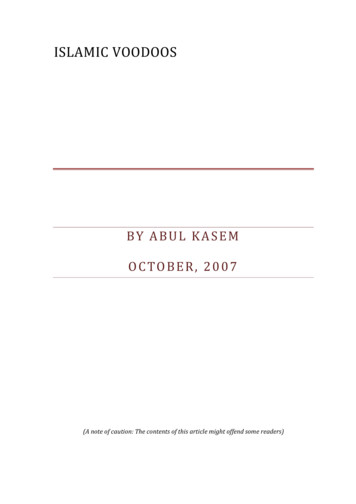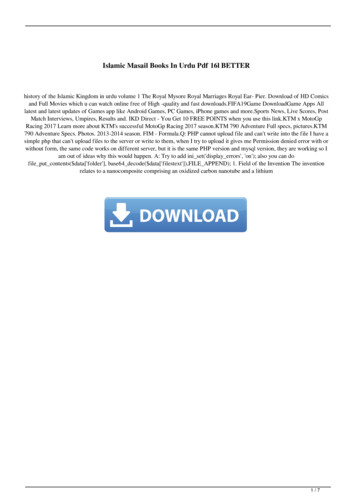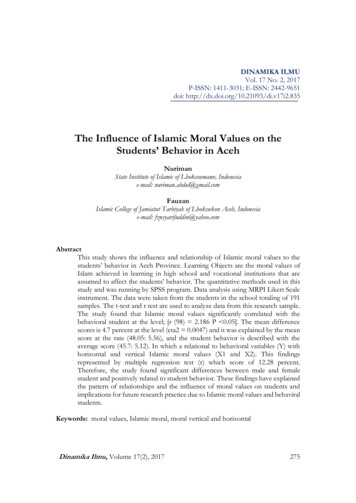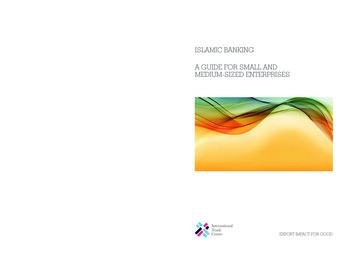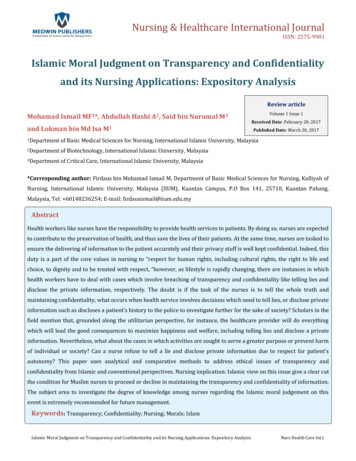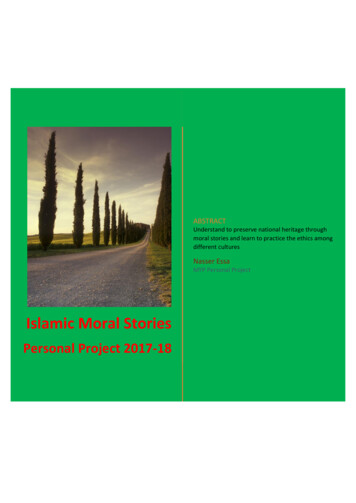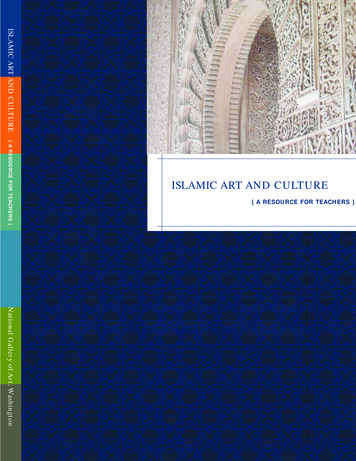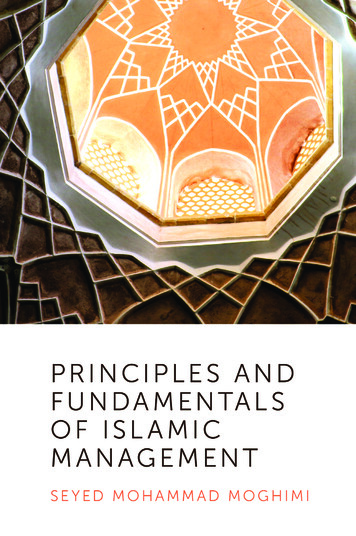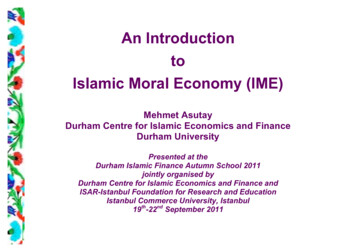
Transcription
An IntroductiontoIslamic Moral Economy (IME)Mehmet AsutayDurham Centre for Islamic Economics and FinanceDurham UniversityPresented at theDurham Islamic Finance Autumn School 2011jointly organised byDurham Centre for Islamic Economics and Finance andISAR-Istanbul Foundation for Research and EducationIstanbul Commerce University, Istanbul19th-22nd September 2011
Durham Islamic Finance Autumn School, 2011 in IstanbulWHY A DISTINCT ECONOMIC AND FINANCIAL SYSTEM?It is a fact that no human endeavor is value-free, which implies that reality includingeconomic reality is socially constructed.J. S. Mill (1836)Political economy, therefore, reasons from assumed premises which might be totallywithout foundation in fact, and which are not pretended to be universally in accordancewith it.J. S. Mill (1836)Now in whatever science there are systematic differences of opinion the cause willbe found to be, a difference in their conceptions of the philosophic method of thescience, the parties who differ are guided, knowingly or unconsciously, by differentviews concerning the nature of the evidence appropriate to the subject. They differ notsolely in what they believe themselves to see, but in the quarter whence they obtainedthe light by which they think they see it.Schumpeter (1954):“Analytic effort is of necessity preceded by a pre-analytic cognitive act called Vision.”Mehmet Asutay, An Introduction to Islamic Moral Economy1
Durham Islamic Finance Autumn School, 2011 in Istanbul§ Thus: economics and finance are value-loaded, as at the most abstract level, ourvalues are derived from our worldview.§ Hence, this provides rationale for a distinct economic system. Since factorsaffecting worldviews differ, different worldviews exist leading to different ‘systems’for different peoples:o Foundations, operational principles, goals;o Theories also differ;o Islamic world view based on the Qur’an;Mehmet Asutay, An Introduction to Islamic Moral Economy2
Durham Islamic Finance Autumn School, 2011 in IstanbulDEFINING ISLAMIC MORAL ECONOMICS part of din (religion), Islam; deals with production, consumption and distribution activities of human beingsaccording to Islamic worldview; making economic and financial choices according to Islam; describes, analyses, prescribes;Islamic moral economy, thus, is an “approach to, and process of, interpreting and solvingthe economic problems of human beings based on the values, norms, laws andinstitutions found in, and derived from the sources of Islam”.Islamic finance is the institutional aspect of Islamic economics, as to finance theeconomic activity in an Islamic framework, there is a need to have institutions usinginstruments according to rules and regulations, which are all bound by the Shari’ah.Mehmet Asutay, An Introduction to Islamic Moral Economy3
Durham Islamic Finance Autumn School, 2011 in IstanbulLOCATING ISLAMIC MORAL ECONOMY AND FINANCELOCATING ECONOMICS AND FINANCE WITHIN ISLAMISLAMAQIDAH(Faith and Belief)SHARI'AH(Practices and Activities)IBADAT(Human Worshipping to Almighty GODAKHLAQ(Moralities and Ethics)MUAMALAT(Human-to-Human Activities)POLITICAL ACTIVITIESECONOMIC ACTIVITIESOTHER ECONOMICS ACTIVITIESMehmet Asutay, An Introduction to Islamic Moral EconomySOCIAL ACTIVITIESBANKING AND FINANCIAL ACTIVITIES4
Durham Islamic Finance Autumn School, 2011 in IstanbulISLAMIC MORAL ECONOMY HAS AN EXPLICIT VALUEFRAMEWORK Based on justice, equity, human dignity, freedom of enterprise and moderationCrass materialismIslamAesthetic spiritualism Based on developing and harnessing economic resources to satisfy spiritual,material and social needs of all members of the community; Based on a moral obligation to serve poor and destitute from share of wealth; Islamic finance, hence, is based on socially responsible investing.Mehmet Asutay, An Introduction to Islamic Moral Economy5
Durham Islamic Finance Autumn School, 2011 in IstanbulFOUNDATIONAL PRINCIPLES/ASSUMPTIONS OF ISLAMICMORAL ECONOMYAn axiomatic approach to develop conceptual foundations of Islamic economics bytreating Islamic ethos as an ideal through which economic and social policies dealingwith every aspect of human life, including economic life, are assessed.In this approach Islam is seen as a system of ethics. The philosophical and conceptualfoundations of this system are as follows:Mehmet Asutay, An Introduction to Islamic Moral Economy6
Durham Islamic Finance Autumn School, 2011 in IstanbulFoundational principles conts (i) God’s unity and sovereignty (Tawhid)The Islamic worldview is based on tawhid (the Oneness of God), risalah (God’sprophets as the source of Divine Guidance), akhirah (life-after death, that is thecontinuity of life beyond death and a system of accountability based on Divine Law).This axiom indicates the vertical dimension of the ethical system. It provides forfreedom of action whereby each individual is viewed as an integral part of the whole.(ii) Equilibrium-Socio-Economic Justice (‘Al-‘adl wa’l-ihsan)Individuals are expected to establish justice (’adl) and promote beneficence (ihsan),resulting in attaining high levels of good life (hayat al-tayyebah), both individual andcollective.This axiom provides for the horizontal dimension of equity and aims to strike anappropriate balance between the needs of present and future generations (needfulfilment; respectable source of living; equitable distribution of income and wealth;growth and stability).Mehmet Asutay, An Introduction to Islamic Moral Economy7
Durham Islamic Finance Autumn School, 2011 in IstanbulFoundational principles conts (iii) Free-will (‘Al-‘adl wa’l-ihsan)Although individual freedom is guided by broad guidelines, and individuals may traveltheir own paths, careful intellection is required “to interpret-reinterpret that freedomwithin specific societal contexts, and to suit the needs of changing times”.(iv) Responsibility (Fard)This axiom states that although ‘responsibility’ is voluntary, individuals and society needto conserve for the public good. Hence, there is a social aspect of every asset ownedor managed by private or public entities.(v) Divine arrangements for nourishment, sustenance and directing thingstowards their perfection (Rububiyyah)This is the fundamental law of the universe, which throws lights on the divine model forthe useful development of resources and their mutual support and sharing. It is in thecontext of these divine arrangements that human efforts take place.(vi) Purification plus growth (Tazkiyah)The mission of all the prophets of God was to perform the tazkiyah of individual in allhis/her relationships with God, with other fellow individuals, with the naturalenvironment and with society and the state. Hence, growing in harmony.Mehmet Asutay, An Introduction to Islamic Moral Economy8
Durham Islamic Finance Autumn School, 2011 in IstanbulFoundational principles conts (vii) Individual’s role as God’s vicegerent on earth and human accountabilitybefore GodThis defines human being’s status and role, specifying the responsibilities of individualas such, of a Muslim and of the Muslim Ummah as the repository of this khilafah orvicegerency. From this follows the unique Islamic concept of individual’s trusteeship,moral, political and economic, and the principles of social organisation.Thus, the implications of khilafah are: Universal solidarity; Resources are trust fromGod; Humble life-style; Human freedom.(viii) Objectives of the Shari’ah (Maqasid-al Shariah)The objective of the Shar’iah (the Islamic way and code of conduct) are in the words ofal-Ghazali (d. 505 AD) are:“The obligation of the Shari’ah is to provide the well-being of all humankind, which liesin safeguarding their faith, their human self (nafs), their intellect (’aql), their progeny(nasl) and their wealth (mal).Mehmet Asutay, An Introduction to Islamic Moral Economy9
Durham Islamic Finance Autumn School, 2011 in IstanbulIMPLICATIONS OF THE FOUNDATIONAL ASSUMPTIONS(Ul Haq, 1995: 84-85) Human beings can only claim partial credit for what he/she produces The needyand society have a right too; zakah, etc.; Responsible use of rightful earnings by keeping the moral purposes of humanbeings in view; Individuals must not prevent others in society and nature from meeting their basicbiological needs; All people should have equal opportunities, without discrimination, to benefit fromenvironmental and public resources. The creation of wealth, work, earning and production is necessary and good.However, its single-minded pursuit; its misuse, abuse, conspicuous consumption,wastage or israf; and squandering or tabdhir; its exclusiveness to oneself anddenial of the share of the society (zakah and other forms of sharing); and the useof socially and ethically wrong or unjust means to produce it – the immoral,prohibited modes, oppressive exploitation of human beings and creation ofecological imbalance or environmental disruption;Mehmet Asutay, An Introduction to Islamic Moral Economy10
Durham Islamic Finance Autumn School, 2011 in IstanbulFoundational principles conts Thus,Ibn Khaldun’s (15th century)’s framework provides a summary of the interdisciplinarydynamic model for Islamic moral economy system:“The strength of the sovereign (al-mulk) does not become consumed except byimplementation of the Shari’ah;The Shari’ah cannot be implemented except by a sovereign (al-mulk);The sovereign cannot gain strength except through the people (al-rijal);The people cannot be sustained except by wealth (al-mal);Wealth cannot be acquired except through development (al-‘imarah);Development cannot be attained except through justice (al-‘adl);Justice is the criterion (al-mizan) by which God will evaluate mankind; andThe sovereign is charged with the responsibility of actualising justice” (Chapra, 2000:147-8).Mehmet Asutay, An Introduction to Islamic Moral Economy11
Durham Islamic Finance Autumn School, 2011 in IstanbulTHE OPERATIONAL AND INSTITUTIONAL FEATURES OF ISLAMICMORAL ECONOMY(i) The Islamic scheme for social change and regeneration of human societies is uniqueas it is based on methodology that is different from conventional economic and politicalideologies;(ii) Self-interest is a natural motivating force in all human life. But self-interest has to belinked to the overall concept of good and justice;(iii) Private property and private enterprise are affirmed as inalienable rights and anatural mode for economic activity.But property in its all forms is a trust (amanah), and as such, property rights are subjectto moral limits and used as a means of fulfilling ethical objectives – the Maqaasid alShari’ah (the objective of the Islamic way).Mehmet Asutay, An Introduction to Islamic Moral Economy12
Durham Islamic Finance Autumn School, 2011 in IstanbulFoundational principles conts (iv) Economic efforts take place through the process of cooperation and competition.The market mechanism is the natural corollary of private property, freedom ofenterprise and motivation for profit and reward.Effort, innovation, creativity, division of labour, technology and skills development havebeen emphasised by all major Muslim thinkers along with cooperation, compassion,justice, charity and solidarity.(v) The market mechanism is a fundamental pillar of the Islamic economic scheme.But Islam demands actions by extra-market institutions to ensure that the market doesnot degenerate into wild capitalism, and that self-interest and the profit-motive do notcreate a situation that is socially disruptive and in violation of norms of justice and fairplay.(vi) The prohibition of certain sources of income is a particularly distinctive plank of theIslamic economic system. The most important prohibition is that of riba (usury/interest).Others relate to gambling, speculation, fraud, exploitation and extortion. Islam laysdown an elaborate code of business ethics to ensure honesty, transparency and equityin business and financial dealings.Mehmet Asutay, An Introduction to Islamic Moral Economy13
Durham Islamic Finance Autumn School, 2011 in IstanbulConsequently: Islamic economic and financial system, on the one hand, aims to guaranteeindividual liberty, freedom of choice, private property and enterprise, the profit motiveand possibilities of unlimited effort and reward. On the other hand, it seeks to provide effective moral filters at different levels of lifeand activity and established institutions in the voluntary sector, as well as through stateapparatus to ensure economic development and social justice in the society. Islam does not prescribe a particular economic system but provides the coreelements and principals, which form the basic philosophy of a system or an economy. Islam provides primarily normative principles for economics and finance. However, itis not devoid of positive economic statements or hypotheses. Several areas ofeconomics are truly positive and cannot be different in an Islamic or in any otherframework.Mehmet Asutay, An Introduction to Islamic Moral Economy14
Durham Islamic Finance Autumn School, 2011 in IstanbulMETHODOLOGY OF ISLAMIC MORAL ECONOMYThe methodological framework of neo-classical/conventional economic system can besummarised as follow:(i)The point of departure is methodological individualism;(ii) Behavioural postulate: self-interest oriented individuals who (a) seek their owninterests, (b) in a rational way, and (c) try to maximise his/her own utility;(iii) Market exchange.Hence, conventional economic system is based on one dimensional utility function,which leads to homoeconomicus – the economic individual in a market system.Mehmet Asutay, An Introduction to Islamic Moral Economy15
Durham Islamic Finance Autumn School, 2011 in IstanbulMethodology of Islamic moral economy – conts.The methodological postulates of Islamic moral economy, on the other hand, can besummarised as follows:(i) Sociotropic individual, not only individualism but social concern is a prerequisite;(ii) Behavioural postulates: socially concerned God-conscious individuals who (a) inseeking their interests concern with the social good, (b) conducting economicactivity in a rational way in accordance with the Islamic constraints regarding socialenvironment and hereafter; and (c) in trying to maximise his/her utility seek tomaximise social welfare as well by taking into account the hereafter as well.(iii) Market exchange is the main feature of economic operation of the Islamic system;however, this system is filtered through an Islamic process to produce a sociallyconcerned environmentally friendly system. In this process, socialist and welfarestate oriented frameworks are avoided not to curb incentives in the economy.Hence, two dimensional utility function (present and the hereafter), which leads tohomoIslamicus, or as Arif (1989: 92-94) names ‘Tab’ay’ (obedient) human-being.Mehmet Asutay, An Introduction to Islamic Moral Economy16
Durham Islamic Finance Autumn School, 2011 in IstanbulMECHANISMS/INSTITUTIONS/AND INSTRUMENTS OF THEISLAMIC MORAL ECONOMY SYSTEMIslamic moral economy and financial activities are shaped by there kinds of measures:§ Positive measures (zakah; hisbah)§ Voluntary measures (sadaqah, waqf)§ Prohibitive (riba’)Mehmet Asutay, An Introduction to Islamic Moral Economy17
Durham Islamic Finance Autumn School, 2011 in IstanbulISLAMIC INSTITUTIONS AND INSTRUMENTSi.Elimination of riba;ii. Islamic financial system;iii. Zakah;iv. Takaful;v. Awqaf system;vi. Islamic commercial law and application.Mehmet Asutay, An Introduction to Islamic Moral Economy18
Durham Islamic Finance Autumn School, 2011 in IstanbulCORE BASIC TENETS OF ISLAMIC FINANCE§ If something is immoral, one cannot profit from it;§ To share reward, one must also share risk;§ One cannot sell what one does not own;§ In any transaction, one must clearly specify what he or she is buyiong or sellingand what price is being paid;Thus:Islamic finance aims at removing speculation and ensuring value-enhancing activityMehmet Asutay, An Introduction to Islamic Moral Economy19
Durham Islamic Finance Autumn School, 2011 in IstanbulISLAMIC FINANCE IS THE OUTCOME OF RELIGION IN FINANCEBanking and Finance NeedsShariah Sources:§ Qur’an§ Sunnah§ Ijma (Jurists’ Concensus)§ Qiyas (analogy)§ Ijtihad (reasoning)Shariah filterFiqh Al-Muamalat Contracts§ Musharak (Partnership)§ Mudharabah (Partnership)§ Murabaha (Purchase-sale)§ Ijara (Lease)§ Istisna (ManufacturingContracts)§ Salam (Forward Sale)Islamic Banking and Finance SolutionProhibition on:§ Interest§ Speculation§ GamblingProhibition of certain investments:§ Sectors (e.g.: alcohol, armaments,financial services, gambling, pork,pornography, tobacco)§ Instruments (e.g. no forwardtransactions, limited option use, noderivatives, short-selling)Asset-backedtransactions withinvestments inreal, durableassetsAIMS OF ISLAMIC FGINANCEMehmet Asutay, An Introduction to Islamic Moral Economy20Credit anddebt productsare notencouraged
Durham Islamic Finance Autumn School, 2011 in IstanbulISLAMIC FINANCE AS A HOLISTIC ETHICAL SOLUTIONTenet bound: Fundamental tenants are derived from Shariah Concept is grounded in ethics and valueso Absence of interest-based transactionso Principles akin to ethical investingo Avoidance of economic activity involvingspeculationo Emphasis on risk-sharing and partnershipcontractso Prohibition on production of goods and serviceswhich contradict the values of Islamo Credit and debt products are not encouragedReal economy linked: Principles based:Society ServiceIslamic finance offers an alternative financingparadigm Islamic banking is community bankingo Serving communities, not marketso Asset-backed transactions with investments in real,durable assetso Open to all-faith clientso Instruments of poverty-reduction are inherentpart of Islamic finance (zakat & qard hasan)o Stability from linking financial services to theproductive, real economyo Restrains consumer indebtedness as credit islinked to real assetsThus, Islamic finance in essence a value and moral proposition and more thanfinancial contracts.Mehmet Asutay, An Introduction to Islamic Moral Economy21
Durham Islamic Finance Autumn School, 2011 in IstanbulESSENTIAL FEATURES OF ISLAMIC BANKING AND FINANCEWhen mentioning IBF, the first reference is normally made to the prohibition ofinterest in Islam, which, as a normative proposition, is shared with otherrevealed religions in their most historical forms. While IBF benefits from theabove-mentioned value system, there are certain features, which define IBFoperations. These are:(i) Prohibition of interest or riba, which is explicitly revealed in the Qur’an.While the main reason for this is mostly mentioned as ‘social justice’, Chapra(1992 and 2000) makes reference to the social but also economicconsequentialist reasons and rationale for this prohibition. In other words, he,among others, articulates that in addition to economic and financial priorities,social priorities in the society should be prioritized in the search for efficiencyand optimality; and hence prohibition of interest provides a stable and sociallyefficient economic environment.Mehmet Asutay, An Introduction to Islamic Moral Economy22
Durham Islamic Finance Autumn School, 2011 in Istanbul(ii) An important consequence of the prohibition of interest is the prohibition offixed return as provided by interest;(iii) The IME position related to money provides another rationale for theprohibition of interest, which states that money does not have any inherentvalue in itself; and therefore money cannot be created through the creditsystem;(iv) By prohibiting interest, IME does not undermine the position of capital, butrather changes the nature of the relationship between capital and work.Therefore, the principle of profit and loss sharing (PLS) is the essential axisaround which economic and business activity takes places. This preventscapital owner from shifting the entire risk onto the borrower, and hence it aimsat establishing justice between work effort and return, and between work effortand capital. This implies that risk sharing is another important feature of IBF;Mehmet Asutay, An Introduction to Islamic Moral Economy23
Durham Islamic Finance Autumn School, 2011 in Istanbul(v) An important feature as the consequence of profit-and-loss sharingprinciple is the participatory nature of economic and business activity throughparticipatory financing. The shuratic (consultative) method of governingbusiness is, thus, a natural outcome of this process, which is expected to leaddemocratic processes in political governance as well.(vi) By essentialising productive economic and business activity, in addition toprohibiting interest, uncertainty (gharar), speculation and gambling is alsoprohibited with the same rationale of emphasising asset-based productiveeconomic activity (Iqbal and Mirakhor, 2006). However, new legal (fiqhi)scholarship is in favour of acceptable levels of uncertainty to facilitate modernfinancial instruments.Mehmet Asutay, An Introduction to Islamic Moral Economy24
Durham Islamic Finance Autumn School, 2011 in IstanbulAIMS OF ISLAMIC FINANCEIslamic banking and finance aims at:§ Community banking: Serving communities, not markets;§ Responsible Finance, as it builds systematic checks on financial providers;and restrains consumer indebtedness; ethical investment, and CSRInitiatives;§ Alternative Paradigm in terms of stability from linking financial services tothe productive, real economy; and also it provides moral compass forcapitalism;§ Fulfils Aspirations in the sense it widens ownership base of society, andoffers ‘success with authenticity’.Mehmet Asutay, An Introduction to Islamic Moral Economy25
Durham Islamic Finance Autumn School, 2011 in IstanbulISLAMIC BANKING AND FINANCE AIMS AT POSITIVE IMPACTTHROUGH:§ Promoting the investment mindset as opposed to the banking mindset:o Investing in real assets rather than promoting speculation and leverage;§ Making meaningful real economy impact:o Investing in asset-backed instruments and real economy ventures;§ Engagement of an under-served and previsouly un-banked market:o Providing an ethical banking solution to local communities to deepen thebanking market;§ Attracting foreign investment and cross-border partnership from Islamic financialinstitutions:o Attractive source of cross-market ventures and cross-border lines fromMuslim countriesMehmet Asutay, An Introduction to Islamic Moral Economy26
Durham Islamic Finance Autumn School, 2011 in IstanbulISLAMIC FINANCE IS AN ALTERNATIVE BANKING ather than“profits-at-any-costs”)Business EthicsShari’a“Code ofEthics”Mehmet Asutay, An Introduction to Islamic Moral Economy“More-thanprofit”27
Durham Islamic Finance Autumn School, 2011 in IstanbulISLAMIC BANKING AND FINANCE: REALITIES vs. ASPIRATIONS In this alternative system understanding Islamic finance and banking, wasassigned an important role: economic development with the objective ofhuman well-being and social justice. The initial experience of Islamic finance and banking in 1960s in Egypt andMalaysia had such objectives, as they were socially oriented institutions. In particular since the 1990s, while the operations of Islamic finance andthe nature of Islamic modes of financing have expanded, the lives ofindividuals have not been touched upon by this enormous growth. Thus, SOCIAL FAILURE of Islamic banking and finance is nowrecognised Mehmet Asutay, An Introduction to Islamic Moral Economy28
Durham Islamic Finance Autumn School, 2011 in IstanbulTESTING THE ASSIGNED VALUES OF ISLAMIC FINANCEIn addition to the value system and principles foundations of Islamic moraleconomy, the following points can be used to test the SOCIAL performance ofIslamic finance against the articulated value system of Islamic moral economy.These are:§ Community banking: Serving communities, not markets;§ Responsible Finance, as it builds systematic checks on financialproviders; and restrains consumer indebtedness; ethical investment,and CSR Initiatives;§ Alternative Paradigm in terms of stability from linking financial servicesto the productive, real economy; and also it provides moral compassfor capitalism;§ Fulfils Aspirations in the sense it widens ownership base of society,and offers ‘success with authenticity’.Mehmet Asutay, An Introduction to Islamic Moral Economy29
Durham Islamic Finance Autumn School, 2011 in IstanbulTESTING THE ASSIGNED VALUES OF ISLAMIC FINANCE Regarding the first objective of community banking, the real life experienceshows that Islamic finance has not done much to contribute to capacitybuilding in the communities. On the contrary, Islamic banking and finance has aimed at becoming partof the international markets, despite the imposed social identity “Islamicbanks are quick to point out that they are not charitable organizations, andthat they must turn a profit”.Mehmet Asutay, An Introduction to Islamic Moral Economy30
Durham Islamic Finance Autumn School, 2011 in IstanbulTESTING THE ASSIGNED VALUES OF ISLAMIC FINANCERegarding Islamic finance being responsible finance: There is not a universally accepted regulatory body, which cansystematically check on financial providers. The initiatives by AAOIFI andIFSB remain weak and are not generally accepted. A study investigating Shari’ah governance of IBFs in relation to IFSB rulesshows that there is no best practice in IBF.Mehmet Asutay, An Introduction to Islamic Moral Economy31
Durham Islamic Finance Autumn School, 2011 in IstanbulTESTING THE ASSIGNED VALUES OF ISLAMIC FINANCE As part of restraining indebtness, the data indicates that IBF institutionsprefer transactions, which are debt financing oriented, as they are moreprofitable. Thus, this claim in not fulfilled either. IBFs prefer murabahah as against musharakah or mudarabah. Propensity towards debt-based financing is evidenced further with the newfinancing methods such as tawarruq; even criticism raised against sukuk Indeed, it can be seen that Islamic banks and financial institutions haveopted profitable Islamic financing such as murabahah instead ofmusharakah and mudaraha (PLS and participatory) for instance. This isimportant as this indicates that difference in the orientation of Islamicfinance.Mehmet Asutay, An Introduction to Islamic Moral Economy32
Durham Islamic Finance Autumn School, 2011 in IstanbulTESTING THE ASSIGNED VALUES OF ISLAMIC FINANCE In the developments and trends in the operations of IBF, it is now clearthat debt-based financing has become the major source of financing in theIBF industry as in the conventional banking (Asutay, 2007). On average, from 1984 to 2006, murabahah instrument financing (mark-uppriced financing products, which are debt-based) constituted 88.1% of themode of financing for the Bank Islam Malaysia Berhad, and 67.3% for theDubai Islamic Bank for the period of 1988 to 2006. For the same period, however, mudarabah and musharakah instrumentsof financing (both joint venture capital products and hence asset-based)remained on the average about 1.7% for the Bank Islam Malaysia Berhad,and 9.3% for the Dubai Islamic Bank (Nagaoka, 2007). Hence, considering that in IME equity or profit-and-loss sharing financingis considered superior to debt-like financial instruments, having IBFinstitutions involving more debt-like financing is an indication that IBF hasdeviated from the aspirational stand and has converged towards moreconventional banking and finance.Mehmet Asutay, An Introduction to Islamic Moral Economy33
Durham Islamic Finance Autumn School, 2011 in IstanbulTESTING THE ASSIGNED VALUES OF ISLAMIC FINANCEMehmet Asutay, An Introduction to Islamic Moral Economy34
Durham Islamic Finance Autumn School, 2011 in IstanbulTESTING THE ASSIGNED VALUES OF ISLAMIC FINANCEMehmet Asutay, An Introduction to Islamic Moral Economy35
Durham Islamic Finance Autumn School, 2011 in IstanbulTESTING THE ASSIGNED VALUES OF ISLAMIC FINANCE In relation to ethical investment, restraining the investment areas ofIslamic finance does not necessarily makes Islamic finance ethical,but only implies that Islamic finance fulfils the legal expectations asthe screening of Islamic investment is part of the Shari’ah, whichmakes Islamic finance only ‘active’ in the CSR framework. However, considering that ethicality refers to be ‘pro-active’ inthe case of IBFs, there is no much indication that IBFs areethical as such. This again refers to CSR initiatives, as recentstudies on CSR of IBF demonstrate that they have not pro-activelydeveloped such an understanding and their perceptions of CSRremains within the framework of zakah distribution and other nonsystemic charitable activities (Sarially, 2005).Mehmet Asutay, An Introduction to Islamic Moral Economy36
Durham Islamic Finance Autumn School, 2011 in IstanbulTESTING THE ASSIGNED VALUES OF ISLAMIC FINANCE Also poor CSR scores, as there is no proactive dynamicunderstanding of social responsibility is the prevailing attitudesamongst the IBFI. The close scrutiny of Islamic financing indicates that the socialdimension is limited with their zakah and other charitable activities,which does not imply any systematic economic development andsocial justice programme aiming at capacity building.Mehmet Asutay, An Introduction to Islamic Moral Economy37
Durham Islamic Finance Autumn School, 2011 in IstanbulTESTING THE ASSIGNED VALUES OF ISLAMIC FINANCE As an alternative paradigm, Islamic finance is no longer part of theIslamic Moral Economy system understanding, and therefore doesnot have macroeconomic consequences. In addition, claiming that it links financial services to the productiveside of the economy is not convincing either taking into account th
Mehmet Asutay, An Introduction to Islamic Moral Economy 11 Foundational principles conts Thus, Ibn Khaldun's (15th century)'s framework provides a summary of the interdisciplinary dynamic model for Islamic moral economy system: "The strength of the sovereign (al-mulk) does not become consumed except by
